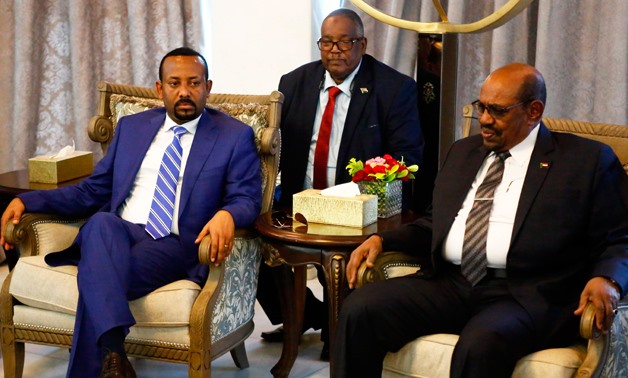
Ethiopian Prime Minister Abiy Ahmed (L) meets with Sudanese President Omar al-Bashir (R) following his arrival in Khartoum for an official visit to Sudan on May 2, 2018. / AFP / ASHRAF SHAZLY
CAIRO – 4 May 2018: Sudan and Ethiopia assured their commitment that Egypt’s Nile water share of 55 billion cubic meters will not be impacted by the under-construction Grand Ethiopian Renaissance Dam, announced Sudanese President Omar al-Bashir in a joint press conference with Ethiopian Prime Minister Abiy Ahmed on Thursday in Khartoum.
Bashir added that he talked with Ahmed on the safety of the dam, noting that it will not pose a threat to the downstream countries of Egypt and Sudan and that the filling of the dam reservoir will not affect the Egyptian and Sudanese irrigation facilities, Egypt’s state-owned news agency MENA reported.
Egypt has voiced its deep concerns over the construction of the dam, as it could reduce the country’s annual share of Nile water. Since 2014, the three countries have held several tripartite meetings and agreed on the Declaration of Principles. However, the difference between the countries relates to the filling and operation of the dam; Egypt demands that this period be 7 to 10 years, while Ethiopia insists on a maximum of 3 years.
The countries also hired two French consultancy firms, BRL and Arterlia, to conduct impact studies of the dam on the downstream countries. Consultation is being resumed to reach a consensus over the introductory report prepared by the two companies.
“Sudan found through the studies that the positive effects of the dam exceed its few negative impacts,” Bashir added in Thursday conference.
In his speech at the conference, the Ethiopian PM stated that Addis Ababa has no intention to cause any harms to Egypt and Sudan, and the Declaration of Principles will help reduce the negative impact and enhance the three countries’ benefits from the dam.
Ahmed’s two-day visit to Sudan came two days before a scheduled 18th round of tripartite meetings among the water and irrigation ministers of the three countries on Saturday.
The committee’s 17th meeting, held in November 2017, did not result in any agreement on the adoption of the introductory technical report.
The real average consumption of water in Egypt is 105 billion cubic meters, only 55.5 billion cubic meters of which comes from the Nile. The remaining 80 billion cubic meters are covered by underground water and the reuse of wastewater.
Egypt’s average water per-capita is expected to drop from 663 cubic meters per year to 582 cubic meters by 2025, according to the Central Agency for Public Mobilization and Statistics (CAPMAS). Addis Ababa, however, claimed that the dam is necessary for Ethiopia’s development and will not harm downstream countries.
Additional reporting by

Comments
Leave a Comment